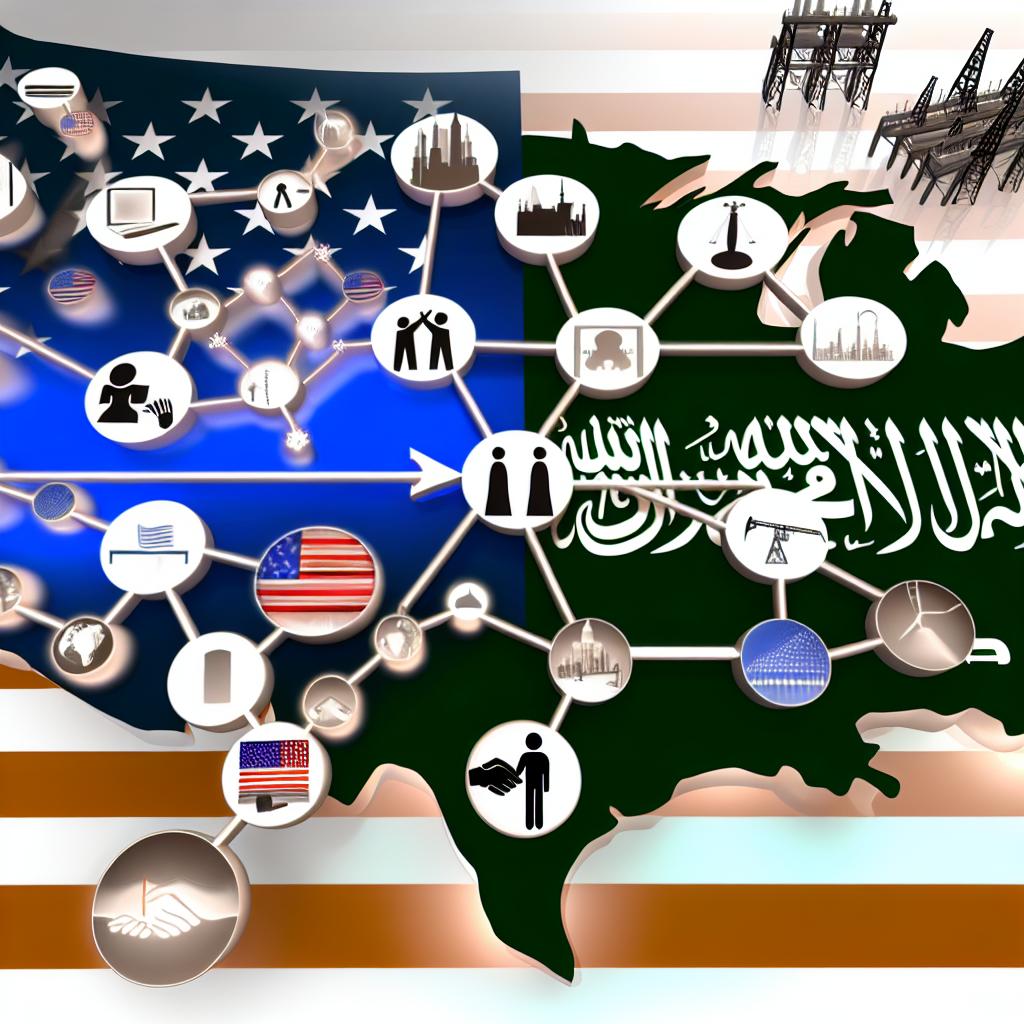The Influence of Social Media on US-Saudi Business Relations
The role of social media in shaping international business relations has grown significantly in recent years, particularly in the context of US-Saudi relations. Platforms like Twitter, Facebook, and LinkedIn provide a unique channel for communication, influencing both the perception and reality of business interactions between these nations.
The Emergence of Social Media as a Diplomatic Tool
Social media platforms have emerged as powerful tools for diplomacy and business communication. Both US and Saudi businesses utilize social media to engage with stakeholders, promote their interests, and respond quickly to global developments. This form of digital engagement is particularly crucial in the context of US-Saudi relations, where timely information dissemination can influence bilateral trade and investments.
Enhancing Business Communication
Social media facilitates direct communication between businesses, government officials, and the public. Companies on both sides leverage these platforms to announce partnerships, investments, and new ventures, thereby increasing transparency and building trust. The interactive nature of social media allows for real-time feedback and engagement, making it an indispensable tool for businesses looking to expand or solidify their presence in either country.
The dynamic realm of social media offers several features that enhance business communication. For instance, platforms like LinkedIn provide a professional space where business executives and government officials can connect and collaborate. This connectivity fosters a networked environment conducive to emergent business proposals and partnerships. Furthermore, such interactions occur in a transparent manner that permits public oversight, thereby fostering a climate of trust.
Moreover, social media offers a cost-effective channel for businesses to communicate with stakeholders. Unlike traditional media channels that can be expensive, social media platforms offer free or low-cost options for message dissemination. This enables even smaller enterprises to reach a global audience, thus leveling the playing field between multinational corporations and small-to-medium-sized enterprises. This democratization of information flow can stimulate competitive business environments, which in turn spurs innovation and economic growth within and between the two nations.
Impact on Public Perception
The perception of US-Saudi business relations can be significantly influenced by social media activity. Organizations and individuals utilize these platforms to share their narratives, contributing to the public’s understanding of the economic ties between the two countries. This can shape investor confidence, consumer sentiment, and ultimately, policy decisions. Enhanced understanding and reduced misinformation can foster a more robust economic partnership.
Social media’s role in shaping public perception extends beyond mere information dissemination; it actively constructs narratives that influence public opinion. By promoting success stories of US-Saudi collaboration, businesses can brighten public perceptions and generate optimism about potential economic engagements. Conversely, the misstep of mishandling sensitive information can lead to diplomatic tensions, illustrating the dual-edged nature of social media.
In addition, the impact on public perception ties closely to brand management for corporations operating in these two nations. The way a company presents itself online can affect its reputation internationally. A well-managed social media strategy can reinforce a company’s integrity, commitment to ethical practices, and transparency, all of which are critical for maintaining investor confidence and consumer loyalty.
Challenges and Considerations
While social media offers numerous advantages, there are inherent challenges as well. The rapid spread of information, including unverified or biased content, can lead to misunderstandings or hastily made decisions. Businesses and policymakers must take care to verify the authenticity of information and remain vigilant against misinformation campaigns that could disrupt bilateral relations.
The unpredictability of social media has necessitated a critical approach to managing risks. Both governments and businesses must enhance their digital literacy and be prepared to address potential crises that arise from social media miscommunications. Developing skills in digital monitoring and employing advanced algorithms to flag misinformation are some methods being adopted to combat this challenge effectively.
Moreover, cultural sensitivity is another key consideration. As entities navigate the nuanced cultural terrains of America and Saudi Arabia, they must remain aware of local customs, languages, and societal values. Content that might be acceptable in one country may not be received well in another, leading to cultural misunderstandings and strained relations. Sensitive handling of content and a keen cultural awareness are therefore crucial for anyone engaging in cross-border social media communications.
Leveraging Social Media for Business Opportunities
Both American and Saudi companies are increasingly using social media to uncover and exploit new business opportunities. The platforms are valuable for conducting market research, identifying partners, and engaging with a global audience. Social media analytics enable businesses to gauge market trends and consumer preferences, which can guide strategic decision-making.
By utilizing analytical tools available on platforms like LinkedIn and Facebook, businesses can derive insights from user data that inform marketing strategies and product development. These metrics provide intelligence on consumer demographics, engagement levels, and geographic trends that are invaluable for making informed business decisions. This shift toward data-driven decision-making is fostering more responsive and agile business practices, allowing companies to swiftly adapt to evolving market conditions.
Furthermore, the global reach of social media provides an unparalleled opportunity for American and Saudi businesses to interact with international clients and partners. This interaction is not just limited to commercial transactions; it includes sharing best practices, technological innovations, and compliance standards, which contribute to a more knowledgeable and integrated global business community.
Conclusion
Social media plays a multifaceted role in shaping US-Saudi business relations. By providing an arena for interaction, communication, and dissemination of information, it enhances diplomatic and business endeavors. As both nations continue to navigate their economic relationship, social media will remain a pivotal element in facilitating understanding and cooperation.
The ability of social media to transcend geographical barriers and cultural differences makes it an essential instrument for contemporary diplomacy and business. As technology evolves and new platforms emerge, the potential for further integration of social media into US-Saudi business relations will grow. Therefore, continuous adaptation to evolving platforms and a strategic approach to navigating challenges will be essential for fully harnessing the benefits that social media has to offer in enhancing bilateral business relations.
This article was last updated on: August 3, 2025




